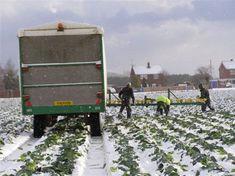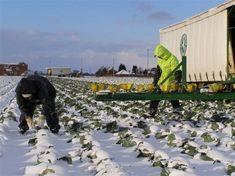

Key vegetable lines could be in short supply on supermarket shelves this Christmas as the UK and Europe battle against sub-zero temperatures.
UK growers are hacking vegetables out of the frozen soil and packing into the night to tackle the ice and snow.
Cauliflower, cabbage and sprouts are among the affected lines, which could jeopardise the supermarkets’ commitments to selling British produce.
One source said: “It is going to be a real problem for supermarkets that have promised 100 per cent British produce when in season, but common sense should prevail as empty shelves will look worse than no British produce.”
Cauliflowers are the worst affected, with the main growing areas of Lincolnshire, Kent and Cornwall experiencing temperatures between -5°C and -7°C this week.
The problem has been exacerbated by poor weather in mainland Europe. The nearest option for suppliers seeking cauliflower is the auction at Brittany in northern France, which had dropped from selling 60,000 boxes a day to around 10,000 boxes on Wednesday.
Prospects for next week look milder, but are still likely to be below seasonal averages with daytime temperatures only getting up to 4°C or 5°C, below the 7-8°C minimum for growing.
Broccoli supplies are also likely to be hit, with heavy rainfall and snow in Spain. Celery, aubergines, capsicum and courgettes are also affected.
Richard Mowbray, commercial manager at TH Clements, which grows in Lincolnshire and Cornwall, told FPJ: “The biggest problem is likely to be cauliflower. Cabbages and sprouts are quite cold hardy and can survive above -1°C with no bruising when harvesting, but cauliflowers need much better weather. There are already French, Spanish and Italian cauliflowers in the supermarkets.
“It is a slower, more expensive process at the moment. We are harvesting at 2-3pm, rather than 5am, some days and packing until midnight. We are having to put staff on standby, making the situation really expensive.”
Met Office predictions covering 9-21 December - the key Christmas harvesting period - forecast freezing temperatures throughout the planted areas.
Sprout supplies have become increasingly strained over the past year, with some retailers already turning to emergency Dutch crops to satisfy demand. Planting conditions were “exceptionally good” this year with the crop sown throughout May, but problems started to arise once the extremely dry weather of July and August arrived in the key period when sprouts put on most of their weight.
The UK sprout industry has a retail value of £54 million a year and has seen steady growth over the past four years, according to Kantar Worldpanel data.
More than 40,000 tonnes are consumed throughout the UK, with the busy festive period accounting for over 67 per cent of the annual tonnage.